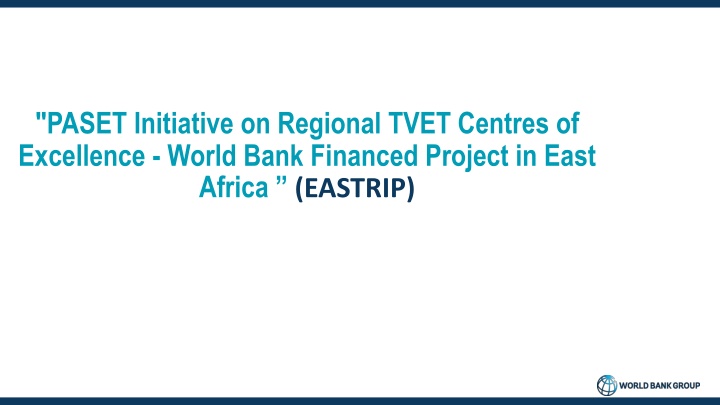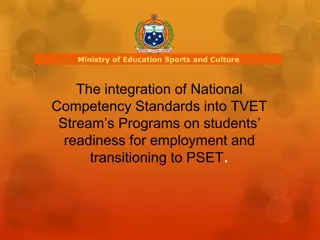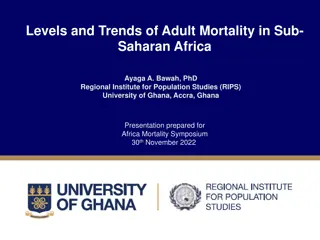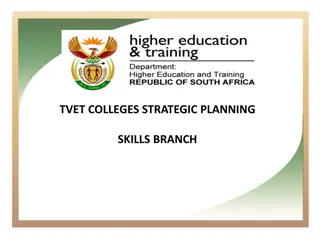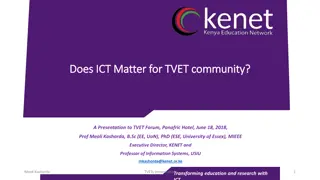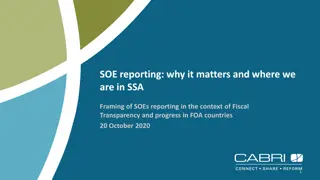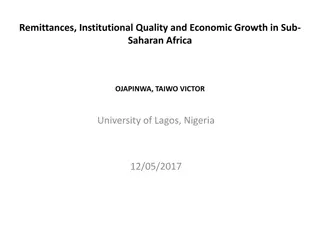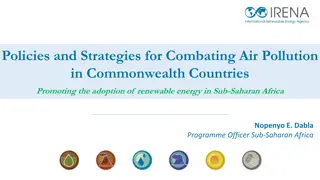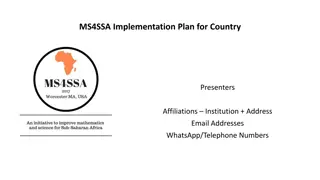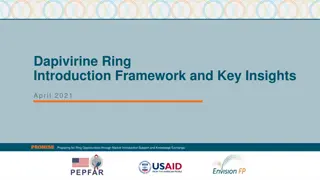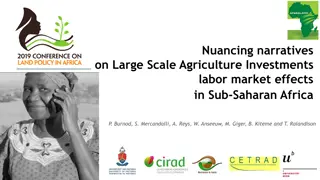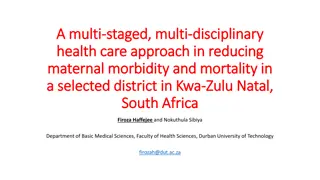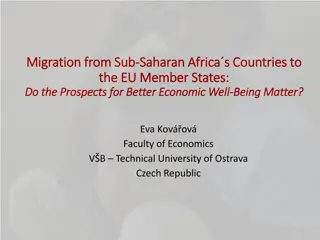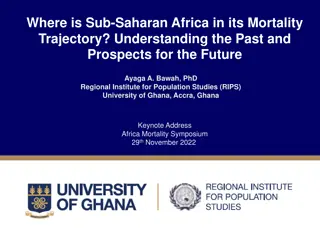Transforming TVET in Sub-Saharan Africa: PASET Initiative Overview
PASET Initiative on Regional TVET Centers of Excellence, supported by the World Bank in East Africa, aims to address systemic skills gaps, enhance educational institutions, and train technicians to meet economic demands. The demand for skilled labor in Sub-Saharan Africa is on the rise, yet TVET enrollment and budgetary allocations remain low, leading to a shortage of specific skills in the region. The status quo underscores the need for transformative action to bridge the skills gap and empower the workforce for sustainable development.
Download Presentation

Please find below an Image/Link to download the presentation.
The content on the website is provided AS IS for your information and personal use only. It may not be sold, licensed, or shared on other websites without obtaining consent from the author.If you encounter any issues during the download, it is possible that the publisher has removed the file from their server.
You are allowed to download the files provided on this website for personal or commercial use, subject to the condition that they are used lawfully. All files are the property of their respective owners.
The content on the website is provided AS IS for your information and personal use only. It may not be sold, licensed, or shared on other websites without obtaining consent from the author.
E N D
Presentation Transcript
"PASET Initiative on Regional TVET Centres of Excellence - World Bank Financed Project in East Africa (EASTRIP)
The Partnership for skills in Applied Sciences, Engineering and Technology (PASET)-An African led solution. 2
-to address systemic gaps in skills and knowledge in priority ASET fields -to build the capacity of African education and training institutions -to train high quality technicians, engineers, and scientists to meet the demands of the economy. 3
Demand for TVET in Sub-Saharan Africa The on-going economic transformation and regional integration initiatives in SSA is boosting the demand for educated and skilled labor 11 million young Africans will enter the labor market every year over the next 10 years Secondary and post-secondary graduates have trouble findings relevant jobs Much larger supply for unskilled (factory floor) jobs Employers importing experienced skilled labor Graduates at all levels without technical training face an especially crowded job market, reflecting an aspirational mismatch as much as a skills mismatch
Status of TVET in Sub-Saharan Africa In 2012, technical and vocational programs accounted for only 6 percent of total secondary enrollment in the region Only 2 to 6 percent of education budgets devoted to TVET Many African countries face brain drain of their top talents Companies operating in African repeatedly cite insufficiently skilled labor as a bottleneck to growth Education acquired in schools is not transferable to the skills required in the job market, thus creating a huge gap in the skills formation Women represent a small fraction of the skilled workforce In the TVET sector, enrollment average is only 4 percent compared to global average of 20 percent Little evidence of purposeful inclusion and prioritization in national development plans of skills development
Shortage of specific skills in Sub-Saharan Africa Shortage of TVET level skills is particularly acute in region s priority industries, including transport, energy, manufacturing (including light manufacturing), and ICT. For instance, - 8,000 to 11,500 TVET-level graduates required by 2025 for energy sector in Ethiopia - 3,000 technical staff required by 2020 in geothermal industry in the region This shortage, if not addressed, could seriously dampen the industrialization and integration agenda. Demand for training institutes which provide TVET level training is high
THE WORLD BANK REGIONAL SKILLS PROJECT East Africa Skills for Transformation and Regional Integration
Proposed Development Objective (PDO) To increase the access and improve the quality of TVET programs in selected Regional TVET Centers of Excellence and to support regional integration and regional economic corridors in East Africa.
TANZANIA KENYA ETHIOPIA Participating Countries
Project Components Component 1: Strengthening selected Regional Flagship TVET Institutes for high- quality skills development in priority sectors Component 3: Enhancing regional collaboration in TVET and project coordination Component 2: Creating national TVET enabling environments
Regional Flagship TVET Institutes Sector Transport/Infrastructure Focus Railway Railway Marine Air Road Building infrastructure Highway infrastructure Power/energy Geothermal Hydro Tool making/ leather Textile/garment Textile Leather Agro-processing ICT Regional Flagship TVET Institute Meles Zenawi Memorial TVET Polytechnic College Ethiopia Railway Academy Kenya Coast National Polytechnic National Institute of Transport Kombolcha TVET Polytechnic College Meru National Polytechnic Kenya Institute of Building and Highway Technology General Wingate Polytechnic College KenGen Geothermal Institute Arusha Technical College TVET Institute Hawassa TVET Polytechnic College Kisumu National Polytechnic DIT Mwanza Campus Holeta TVET Polytechnic College DIT Dar es Salaam Campus Country Ethiopia Ethiopia Kenya Tanzania Ethiopia Kenya Kenya Ethiopia Kenya Tanzania Ethiopia Ethiopia Kenya Tanzania Ethiopia Tanzania Power/Energy Manufacturing ICT
Regional Flagship TVET Institutes
Component 1: Strengthening selected Regional Flagship TVET Institutes for high- quality skills development in priority sectors SUBCOMPONENTS/ACTIVITIES 1. Strengthening governance and management 2. Institutionalizing industry links 3. Developing market relevant competency based training programs 4. Training of TVET managers and teachers 5. Upgrading key training facilities and equipment 6. Outreach and support for non-project national TVET institutes 13
Component 2: Creating national TVET enabling environments SUBCOMPONENTS/ACTIVITIES 1. Strengthening national TVET quality assurance 2. Capacity building for TVET policy development and implementation 3. Promoting regional integration 4. Facilitating national project coordination, and M&E 14
Component 3: Enhancing regional collaboration in TVET and project coordination SUBCOMPONENTS/ACTIVITIES 1. Harmonization of standards and mutual recognition of qualifications for priority occupations 2. Facilitating student and staff mobility through exchange programs 3. Regional project coordination and M&E 15
Project Implementation Arrangements
World banks Regional Approach to TVET Development: its significance A regional approach to developing the specialized TVET skills can have a number of benefits:- -Regional integration has been an important development agenda for Africa since independence. Agenda 2063 -Exploiting economies of scale to lower costs of training for individual countries on specialized and industry certified training programs, -facilitating mobility of people and skilled labor, -promoting peer learning among countries and institutions -sharing good policies and practices -targeting employment toward regional economic corridors
Regional Approach to TVET Development: its significance -Harmonization of standards and mutual recognition of qualifications are critical for the mobility of skilled labor -A network of Regional Flagship TVET Institutes can provide a learning and knowledge-sharing platform critical for sustainable TVET development at the national and regional levels -A regional flagship approach can complement existing national skills and TVET programs. -Globally, the flagship approach has been used and proven effective in not only serving the short-and medium-term needs of skills development but also in catalyzing broader national reform and injecting dynamism into the system.
Capacity Building and TA, supported by WB, Korea, China EASTRIP Addis Ababa Capacity Building Workshop (January 2018) EASTRIP Study Visit to Korea (March 2018) EASTRIP Nairobi Appraisal Capacity Building Workshop (June 2018) EASTRIP Procurement Capacity Building Workshop in Nairobi (July 2018) Technical Assistance for the development of Strategic Investment Plan for the 16 RFTIs (Dec 2017 August 2018) EASTRIP Study Visit to China 2nd Africa China WB Education Partnership Forum (August 2018) EASTRIP visit to power transmission station in Holeta Ethiopia (March 2019) EASTRIP Project Operational Manual Validation Workshop (March 2019) EASTRIP visit to East Industry Park (May 2019) Technical Assistance for capacity building and baseline of graduate tracer study for the 16 RFTIs (June 2019 December 2019) Scholarships for master degree study in the Chinese Agriculture University (September 2019) Dar es Salaam Institute of Technology and MIT capacity building in short term professional courses (August 2019) 19
EASTRIP CURRENT STATUS Board Approval: October, 2018 Effectiveness: IUCEA (3/19); Ethiopia, Kenya, and Tanzania effective soon; Disbursement: 30% advance upon effectiveness and thereafter DLI-based Project implementation: 2019 to 2024 Regional Steering Committee (RSC) operational; National Steering Committee (NSC) in each country being constituted EASTRIP Technical Advisory Board being constituted IUCEA project coordinator recruited and additional members being recruited Project Operation Manual developed Each flagship has an approved Strategic Investment Plan, procurement plan, gender strategy, staff development plan, results framework Each RFTI has a project implementation team and has established Industrial Advisory Board WB and IUCEA ongoing supervision 21
